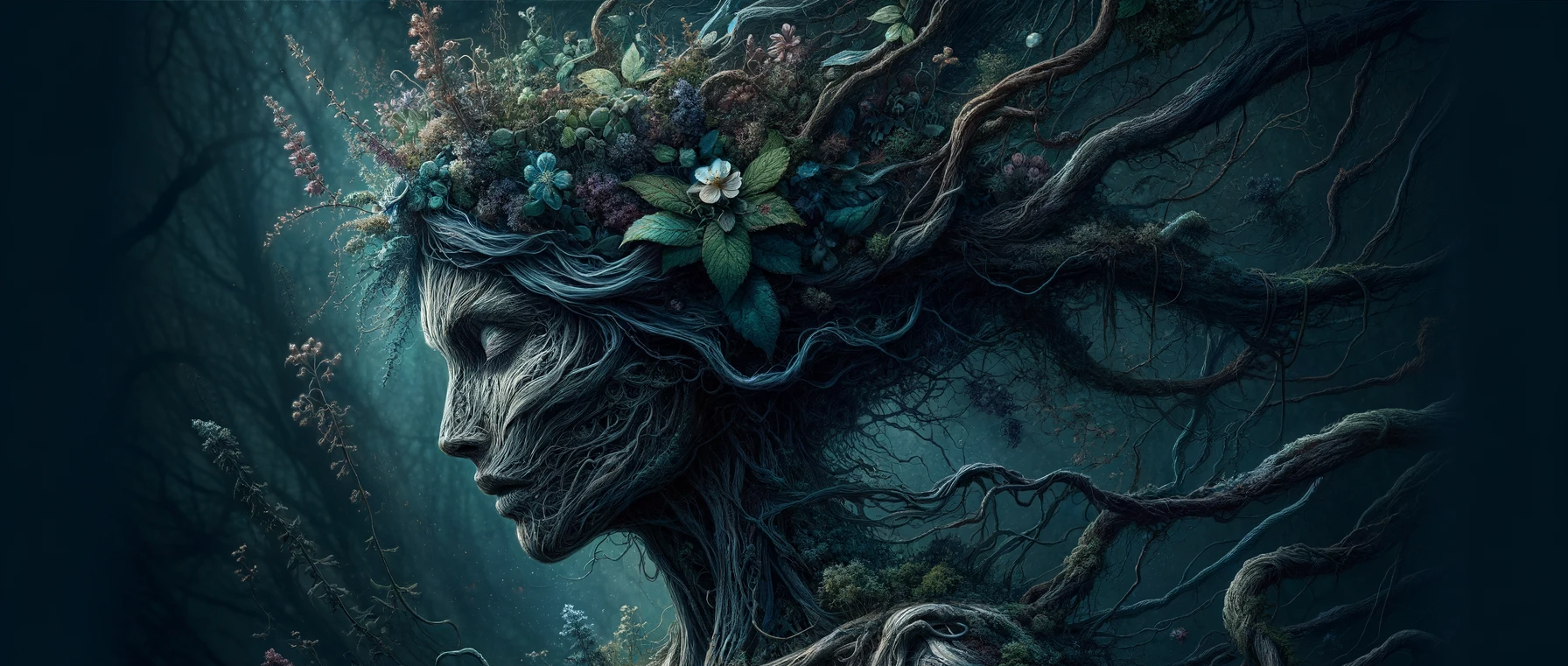In the heart of an ancient, whispering forest, where the light of the sun rarely kissed the soil, stood a being of wood and sorrow, known to the few who dared to roam these woods as the Weeping Mother. Her form was that of a majestic tree, and yet, in the gentle curve of her branches, one could discern the silhouette of a woman. Her skin was bark, rough and etched with the grooves of countless years; her hair was a cascade of vines and moss, adorned with the vibrant hues of forest blooms that attracted the most delicate of butterflies.
The Weeping Mother had not always been a creature of bark and leaf. Long ago, she was a woman of flesh and blood, a guardian of the forest with a voice as clear as the mountain spring. The forest had been her solace, her children the trees and creatures within. But when men came with their axes and fires, intent on bending the wild to their will, she stood against them, her words stirring the hearts of the bravest.
In their fear and greed, the men cursed her, a spell so dark that it rooted her to the very ground she sought to protect. As her feet sank into the earth, and her arms stretched towards the heavens, she became the sentinel she had promised to be, at a cost most dire.
Eons passed, and the memory of the woman faded into legend, leaving only the Weeping Mother, a sentinel of the forest. Yet, she remembered. Each leaf that fell from her was a tear shed for her lost humanity, each new bloom a hope for redemption that never came. The creatures of the forest, from the smallest beetle to the noblest stag, paid homage to her, whispering their secrets and sharing their sorrows with her, for they knew she was kin.
But the Weeping Mother could offer no words of comfort. Her voice, once melodious, was now but the rustling of leaves. The men who had cursed her were long gone, their kingdoms turned to dust, but her penance was eternal. The curse had bound her not only to the land but to the very cycle of life and death within the forest. With every season’s change, she felt the joy of new life and the bitter sting of inevitable loss, each adding to her burden.
As the centuries stretched on, even the forest began to change. The whispers of the ancient ones grew silent, and new seeds sprouted, oblivious to the history they grew upon. Yet, the Weeping Mother remained, a monument to a bygone era, her form a stark reminder of the cost of hubris and the enduring strength of nature.
In the stillness of the twilight, when the fog rolled in like a gentle shroud, one could hear the softest sob from within the groves, a lament for a time when she danced freely under the moonlight, unencumbered by the weight of her wooden prison. It was in these moments that the forest seemed to hold its breath, mourning with her, until the dawn’s light washed away the sorrow, leaving only the silent majesty of the Weeping Mother, standing guard over a world that had moved on without her.
As dawn unfurled its golden fingers through the mist, the Weeping Mother’s silhouette became less distinct, more a part of the landscape than ever before. It was then that a new form emerged from the shadows of the trees—a child, no older than the spring itself, with eyes wide with wonder. The child approached the Weeping Mother, unafraid, for children often see the truth that time veils from older eyes.
The child, a daughter of the nearby village, had heard tales of the forest’s guardian from her grandmother, stories whispered at bedtime of a woman who became a tree. With each step closer, the child felt a warmth that seemed to beckon her near. She reached out a tender hand, not to the rough bark, but to the space where the heart of the Weeping Mother would be if she were still made of flesh and blood.
As her small fingers brushed the cool wood, a miracle unfurled. Where there had been silence, there was now a song—a melody so pure and sad that it seemed to be the voice of the forest itself. The song told of love and loss, of battles fought and beauty sacrificed. It told of a heart that beat beneath the bark.
The forest listened, and in that moment, the curse that had held the Weeping Mother captive for so long began to fray at the edges. The vines loosened, the branches shrank back, and the blooms that crowned her head showered down in a cascade of color. Where there was wood, skin began to show; where there were twigs, fingers started to form.
The child watched in awe as the transformation took place. As the last note of the song faded, the Weeping Mother took her first breath as a woman in centuries. Her eyes, reflecting the depth of the woods, met those of the child, and in them, the child saw the gratitude and love of a thousand lifetimes.
With her feet now free, the Weeping Mother stepped forward, her steps unsteady as she relearned the motion. The forest, recognizing the sacrifice of its sentinel, seemed to bow in reverence, the creatures coming forth to witness the rebirth of their protector.
The Weeping Mother knelt before the child, her voice no longer just a whisper of leaves but rich and full. “You have freed me,” she spoke, “not with magic or power, but with pure belief and innocence.”
Hand in hand, they emerged from the forest, the light of the sun warm upon their faces. The villagers marveled at the sight, and from that day forward, they tended to the woods with care and respect, understanding at last that they were not masters of the wild, but part of its intricate dance.
And as for the Weeping Mother, she became a guardian once more, not of trees and beasts, but of the harmony between man and nature. She walked the woods by day and danced under the moon by night, free and unbound, a bridge between two worlds that were once at odds.
Her tears, once of sorrow, now fell as drops of joy, nourishing the very ground she had been one with for so long. And in the heart of the forest, where her story had begun, a new tree grew, its branches reaching high, a living monument to the enduring cycle of endings and beginnings, and the enduring power of an untamed heart.

